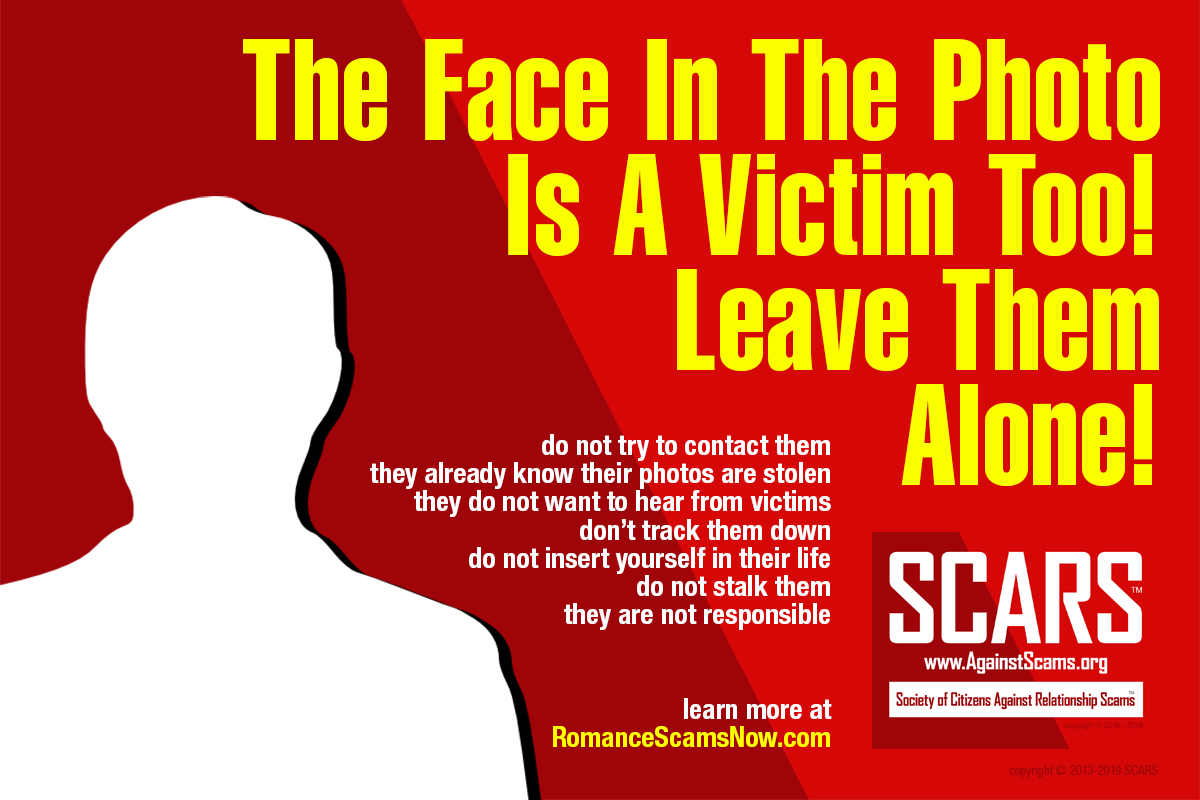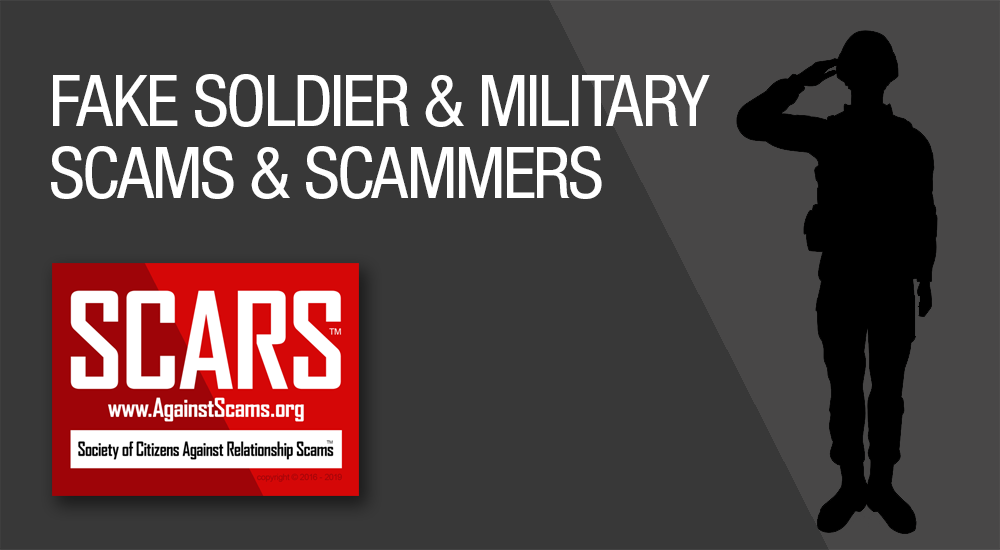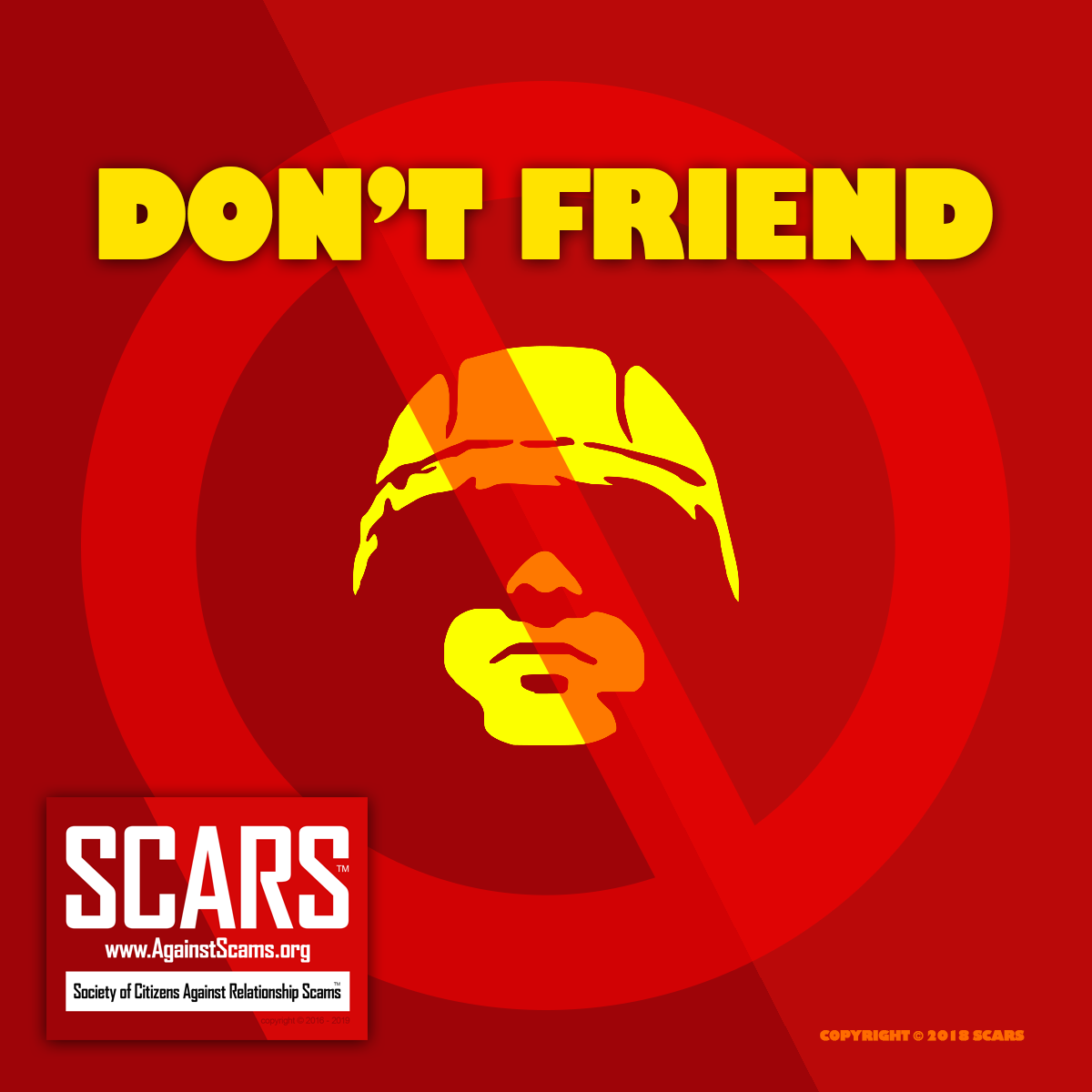United States Military & Social Media – a SCARS Guide
Learn how the U.S. Military Works & Uses Social Media
This guide covers the rules and limitations of the U.S. Military Online!
Here is the Information You Need to Understand the U.S. Military & Social Media
To be able to Identify Fakes and Scammers You Need to be able To Recognize and Understand the Real Military
This guide will help victims and potential victims understand the United States Military (and NATO member countries) better.
1. MILITARY SCAMMER / FAKE SOLDIER URBAN LEGENDS
So much of the information is spread around about scammers and fake military is nothing but an urban legend. False information, misinterpretation, or rumors spread like lice in a preschool.
This article will help to clear up many of these preconceptions that are nothing but urban legends and replace them with fact. After all, the fact is the spotlight that exposes the dark and sends scammers scurrying away like cockroaches
Why Do You Have To Learn All Of This?
Every task in life requires certain skills to perform it safely. Some are very complex, and misoperation can result in death, others just ruining something without risk of injury. The Internet and Social Media are somewhere in the middle. Incompetence can result in severe injury to yourself and others – financial, emotionally, and even physically.
Think of the Internet like a car. You know driving a car is complex, right? Yet, every teen thinks they can just jump in and drive. They neither have the skills nor the maturity to drive competently. We all acknowledge that driving is something we have to learn and be trained for, or we risk the loss of our lives and those we care about. However, it is unlikely that anyone reading this has ever considered that the Internet is every bit as complex and dangerous to incompetent users.
What you do online can and does hurt others, and it is about time that everyone realized this.
This document is just one lesson in developing your understanding of online safety. This is your set of training wheels!
U.S. Soldiers in Africa
Yes, the United States has military personnel in EVERY country on Earth (except a handful). Most of these are assigned to United States Embassies, however, there are active military missions in over 100 countries – mostly fighting terrorists around the globe. Not since World War 2 has there been a deployment of United States and NATO forces in more counties.
The United States maintains its African Command in Germany, but has offices in Nigeria and deploys from there into most of Africa. To learn more about the U.S. Africa Command go here: « http://www.africom.mil »
So yes, we have soldiers in Nigerian (supporting the Nigerian Army). In fact, U.S. Special Forces (SpecOps) were killed in Chad not so long ago.
This does not mean that the soldiers you do not know are going to contact you or that they are real. They are NOT.
2. U.S. MILITARY SOCIAL MEDIA POLICY
Social media is a part of our daily lives. The U.S. Military uses it officially as a powerful tool to share the United States Military’s story. It helps them to create meaningful connections with national and global audiences, which maintains their trust and confidence in America’s military.
The United States Department of Defense acknowledges the importance of social media and encourages its commands, Soldiers, Families, and Military Civilians to safely and accurately use social media to share their experiences and provide information.
Advances in technology and accessibility to connected mobile devices, combined with society’s acceptance of social media, have changed how information is delivered and how people, organizations, and government entities communicate.
It Is Governed By Strict Rules
Department of Defense Instruction (DODI) 8550.01 released Sept. 11, 2012, provides guidelines for the military use of social media. The instruction acknowledges that Internet-based capabilities are integral to operations across the Department of Defense, but are not to be used casually and never to share inappropriate information.
The “All Army Activities” message, published February 2017, also reemphasizes that Soldiers are held to the standards of the Uniform Code of Military Justice and Army Values when using social media, even when off duty. Commenting, posting, and linking to material that violates the UCMJ or basic rules of Soldier conduct are prohibited, along with talking negatively about supervisors or releasing sensitive information. This is the Military’s criminal code of conduct.
What Does This Mean?
It means that United States Military Personnel (and there are similar rules for NATO Personnel) are criminally responsible for what they post or communicate on social media.
THEY CANNOT POST, EMAIL, OR MESSAGE ABOUT DEPLOYMENTS AND ACTIONS THAT IN ANY WAY JEOPARDIZE THEIR MISSIONS AND THEIR FELLOW PERSONNEL, OR THE SECURITY OF THEIR OPERATIONS OR THE U.S.
This means that NO one in areas of operations is going to be reaching out to strangers.
To their existing family and friends yes – within the limitations permitted by policy, but not strangers. It also means that they are subject to obtaining permissions and review of all of their communications.
3. MORE RELATED MILITARY POLICIES
- The Hatch Act is another policy and rule set that applies to Federal Employees and the Use of Social Media and Email: https://osc.gov/Pages/The-Hatch-Act-Frequently-Asked-Questions-on-Federal-Employees-and-the-Use-of-Social-Media-and-Email.aspx
- There are also many other policies that apply, such as: https://www.oge.gov/web/oge.nsf/0/16D5B5EB7E5DE11A85257E96005FBF13/$FILE/LA-15-03-2.pdf
How Soldiers Communicate
At one point or another, almost all scammers communicate by email. If they have not yet, then demand their email address and exchange emails to confirm that it works.
The United States Military communicates using a set of channels approved and authorized, and more importantly controlled by the military. This means that all personnel will use DOT MIL (.mil) email addresses. BUT there are other U.S. Military DOT domains as well
Here is the Official List of U.S. Government Domain TLD (Top Level Domains) that can ONLY be used by the United States Government.
U.S. Government Only Domains: .GOV (American Government – Local, State, and Federal), .MIL (Military)
DO NOT CONFUSE .ML (which is for Mali) for Military .MIL – or .GW (which is for Guinea-Bissau) for Government .GOV
While there are many similar domains – here is a list of ALL of the National TLDs: « https://icannwiki.org/Country_code_top-level_domain
4. MILITARY ID CARDS
The rule about the United States’ Military ID cards is very simple. They cannot be copied, scanned, duplicated, or photographed EVER. To do so is a crime.
IF ANYONE EVER SENDS YOU A COPY OF THEIR ID CARD IT IS (BY DEFINITION) A FAKE OR A CRIMINAL ACT!
Here is the applicable rule: Photocopying military, CAC IDs a violation of federal law – https://www.army.mil/article/28452/photocopying_military_cac_ids_a_violation_of_federal_law
5. HOW TO IDENTIFY U.S. MILITARY PERSONNEL IN THEIR PHOTOS
One of the most important ways to identify fakes is by the uniform rank insignia. Scammers rarely understand the significance of rank, and also rank will show in photos (unless photoshopped out). Here are guides to help you identify U.S. Military ranks for Officers and Enlisted personnel.
Enlisted & Officers Ranks & Insignia – click here
You can also learn more about military ranks for ANY COUNTRY on Wikipedia: https://en.wikipedia.org/wiki/List_of_comparative_military_ranks
6. WHERE THE MILITARY ARE STATIONED
Military personnel are forbidden from disclosing the actual deployment location when in active combat areas. The only personnel that can are those assigned to diplomatic posts at embassies. Yet scammers love to expose their locations as a statement of authenticity.
If someone ever says where they are stationed or deployed, you can check if it is a valid military base here: https://militarybases.com/overseas/
7. THE QUESTION OF SENDING MONEY TO SOLDIERS
U.S. Military personnel are fully funded by the U.S. Government for ALL essentials. They do not pay for meals, travel, or essentials. Or for leave!
They also do not have to pay to go on LEAVE or be DISCHARGED EARLY! They just have to ask.
What about family needs? One of the common scams is to ask for money to be sent to a family member in need. Except that there are many U.S. Support Organizations that help military families, not to mention that one soldier’s family will always help another. Military personnel are part of one of the largest communities on Earth – they take care of their own. They do not need a stranger’s help.
This is really not complicated. Any soldier that says they need money from you IS A SCAMMER!
SUMMARY
With these tools, you should be able to identify fake soldiers and service personnel. If you can’t be sure if some stranger is real? Just assume he or she is a scammer and you will be safe – because 99% of the time they are a scammer.
Just remember this, that no real soldier is going to contact total strangers when they are stationed overseas on deployment. Any such contacts should always be treated as a scammer!
Stay Safe Online!
TAGS: SCARS, Information About Scams, Anti-Scam, Scams, Scammers, Fraudsters, Cybercrime, Crybercriminals, Romance Scams, Scam Victims, Online Fraud, Online Crime Is Real Crime, Scam Avoidance, Fake Soldiers, Fake Military, Real Military, Army General, Real Soldiers, United States Military, U.S. Army, U.S. Navy, U.S. Marine Corps, U.S. Coast Giard, U.S. Space Force,

PLEASE SHARE OUR ARTICLES WITH YOUR FRIENDS & FAMILY
HELP OTHERS STAY SAFE ONLINE – YOUR KNOWLEDGE CAN MAKE THE DIFFERENCE!
THE NEXT VICTIM MIGHT BE YOUR OWN FAMILY MEMBER OR BEST FRIEND!
By the SCARS™ Editorial Team
Society of Citizens Against Relationship Scams Inc.
A Worldwide Crime Victims Assistance & Crime Prevention Nonprofit Organization Headquartered In Miami Florida USA & Monterrey NL Mexico, with Partners In More Than 60 Countries
To Learn More, Volunteer, or Donate Visit: www.AgainstScams.org
Contact Us: Contact@AgainstScams.org








I met a “soldier” on Tinder. Later, he wassapped me. He is sending videos of himself but says he cannot video me lately. Sends pics. I am very familiar with Army – my brother is in the Army. Although, when he asked me to send him money because he hates the food in Ukraine, I tough …really? Can soldiers send videos too. I understand the whole getting someone’s identity. This soldier says his name is Sergio Montalvo. IDK I WILL NEVER SEND MONEY BUT I WAS BLOWN AWAY WHEN HE SAID THAT. THOUGHTS?! ty I feel bad for the real soldier who he may be impersonating or not. Also, He says he is coming back to base here in ABQ, NM on Feb 26th and asked me to pick him up.
You are being scammed by a professional cybercriminal. Block him, and move forward. It really is that simple. Please read out guides and you will learn the skills you need to stay safe online. But most importantly, stop talking to strangers online.
DEPARTMENT OF DEFENSE
UNITED STATE OF AMERICA
PEACE-KEEPING BASE IRAN DR c/o UAE Office
This is to notify that Sergeant Aaron porter of US / US Army request has been by the department of defense US Army for retirement procedures, and marriage plans for a duration
of three months, and sub-sequence transfer which commences on the 19th of this month.
We really appreciate his contribution and effort towards the better America,
The department of defense wishes him a happy vacation trip to Latvia under defense section 202 on absence from duty with emergency permission from service duty.
US Army is trying to restore peace in Iran since the war started through the contribution of the US Army and UN in general, on this occasion we remember our fallen soldiers that have laid their lives for protection of our countries.
Note: You are to pay the sum of One thousand two hundred and fifty
dollars ($1250 ) for his flight ticket and replacement of another soldier, and this payment should make on or before 5 working days.
My story is also very similar! I spoke with love about the future. How he loves my son! Until they asked me to transfer money, I did not transfer money and love passed!
And after all this, I would really like to meet this soldier in reality!
Why did you post this in a comment? This doesn’t really help. Please report it correctly. Look in our menu.
One Men who name Ramon Colon Lopez is currenty in Afghanistan
He is asking my friend to help his son
I would’ve to know where is exactly location of Chief Master Seageant Ramon Lopez
Mia your friend is being scammed. This is not a real person. It is an imposter using stolen photos.
I’m not sure about this one. Everything This lady told me appears to be true. She Is currently working under strict security at the North Bay Norad site, Ontario, Canada. And is a Consultant Chef, in charge of all Senior officers meals.
She recently lost a phone while pleasure boating, overboard. She claimed to have a corporate bank account with Skynet???? I don’t know how but I have looked into her account and it appears to be very healthy. I have checked with so many Banks to ask if this is a legitimate Bank but all I was told to check the bank myself, phone them. (Yeah right phone what is thought to be a dodgy Bank and ask them if they are real) DER. Thanks for that SANTANDER UK.
Anyway I have all her details of the account and she has told me to withdraw enough cash to see me through the months of November until she can get leave in December. She also wanted me to buy her a phone and laptop with the money and a present for her of my own choice.
I have asked Friends online from Canada to ask if they had heard of this Bank. Some say no, Most say they have. I feel sick inside as she is a beautiful woman, and I have fallen deeply in love with her.
She has a friend on the base that is on Facebook, we did become good friends. This woman is supposed to be a Capt. She always let me know how my love was doing, if she had been upset or crying over a little tif we may have had.
Most about her not being real, as I found on Facebook a page with all my lovers details on except a date of birth and an older phone number. Plus It had a photo of her, I reported it and since it has disappeared.
This what I thought was a fake FB page, but still got in touch. Well this is where the story really lit up lights for me. She (my lovers double) Told me she was somewhere in South America, I’m not giving precise details as maybe against the law. Anyway she claims to be where she is, in hiding. As she was found in a hotel room with a dead person next to her. And claims she was drugged up and planted there by an ex boyfriend. The ex wants her dead apparently so that he can claim her money. It all sounded very convincing to me, but I told my lover what went on, but thinking she could be fake as well, never told her the whole story.
My lover told me that she had an affair which went on for some time, She had brought this guy a Mobile home for his birthday, and gave him several thousand dollars to help with gambling addiction. Any way he got posted to the middle east and she found out another woman was pregnant by him. Yes he was a soldier too.
The brunt of this story is that I just don’t know what to believe, is she fake, is the bank fake. Whatever our relationship is over because I truly thought she was a fake. As all family and friends have told me to steer clear.
Another thing I tried looking into myself was, Is North Bay Norad Operational still I have been told it’s been empty for years.
WOW OMG That was one crazy story and one that is brand new! A million thanks for that one.
Ok, by the numbers.
1) The idea of a contractor working on a military base if not unreasonable. She needs you to buy a phone with her money? Amazon works just fine, plus a zillion other ecommerce companies, plus she would need to buy it from a phone company to transfer her account to the new phone.
2 This is the great part and us truly scary. These scammers invented their own bank. NO ONE in North America would start a bank called SKYNET – we already think banks are plotting to destroy us, but with the brand from the Terminator movies? Really? No way. But the good news is that we looked at the website and it is a true fake. Plus we have a 2018 directory of ALL banks in Canada. Everything is available if you look for it. So this is as bogus as a kangaroo in Nigeria.
This is a far more serious fraud that it might appear at first glance. We would like to use your information to both put up a warning post (without your name), and also to reach out to our friends in the RCMP and CDN Regulators. They can have the website shutdown. We will post the complete banking list for Canada also to help with any other victims that have become snared.
Thank you again, and shut it down and block this scammer ASAP – you were almost lured into money laundering at the least and possibly bank fraud.
Best of luck.
To lean more about this scam go here: https://romancescamsnow.com/dating-scams/scarsrsn-special-report-scam-warning-new-fake-bank-scam/
Your above comment is very interesting and true. It is tragic how peo[e react. Everybody is guilty, accept them. Falling for their manipulations and love talk, out of loneliness or whatever., and given money at own will, is the center of this al. I completely. lost confidence in social media. I have seen scam heaters groups fighting among each other, and one of the biggest scam heaters I corresponded with after I checked her out was the biggest scammer of them all. So sad. Who can one trust nowadays
You have discovered the most valuable truth – trust no one online! Not even us. Take what we offer if you find it useful.
From the very beginning, we worked with government to establish laws and regulations to guide the (so-called) ant-scam industry. Crime victims assistance is regulated in most major countries, but the scam hater groups don’t care they are only interested in expressing their own rage and the victims are just in the way. You are welcome to see who we are at http://www.AgainstScams.org You will find our Code of Conduct and the NOVA Standard that we follow as well. You are welcome to ask us anything, that is the true difference between the opaque one person in a kitchen anti-scam groups, and a transparent incorporated non-profit non-governmental organization like SCARS.
Does the military send troops bonus money to the troops account or can they send it to the beneficiary before coming home from deployment? When a troop is asking for leave what is the process for them to come home? Do they have to pay for there own flight home?
All fake information – you are being scammed
hola, soy una chica Española y me han intentado estafar desde varios sitios de Internet desde el facebok o el instagran
y me siguen acosando estafadores, pero ya se las pautas que usan y desde el principio los bloqueo, sobretodo cuando me dicen que han visto mi perfil y ha visto que soy una persona amorosa ¿como van a ver nada si lo tengo todo bloqueado y protegido? los bloqueo inmediatamente.
estos personajes se aprovechan de las personas que están solas y nosotras tenemos que ser mas listas que ellos, en el momento que alguien les diga que están enamorados de usted tan solo al hablar con ellos un día ya deben saber que es un estafador y no digo mas si les llegan a pedir dinero.
saludos y ánimos a todos
Lo sentimos por tu experiencia Nuestra organización tiene muchas páginas de Facebook y grupos de apoyo en español. Serían un mejor recurso para que lo ayude a comprender y recuperarse de su estafa.
Estas son páginas de educación e información sobre estafas y estafadores:
http://www..facebook.com/Amigas.Contra.Estafas/
http://www.facebook.com/Amigas-Mexicanas-Contra-Estafas-454422928330713/?business_id=442581842758085
Aquí está nuestro grupo de apoyo para víctimas de estafa en español:
https://www.facebook.com/groups/Ayuda.y.Apoyo/
Whose side are you on? The information provided in this article is of GREAT use for SCAMMERS.
We block all visitors from scamming countries, including all of Africa & the Middle East
I meet a man that said he waa a seargent in the us army by the name Michael smith. He gave me some said stories and i had been sending him money he promised to marry me. I started checking scams they used and he got me on all them i am out of $4,000.00. That he has promised to pay me back. What made me check was the address was never a miltary address with and apo it was sent in a african name. I really got scamed.
Did he ever ask for an Amazon Music card?
I HAD TWO THAT REQUESTED AMAZON CARDS SO THEY CAN CHAT WITH ME VERY DISAPPOINTING THAT PEOPLE USE REAL US SERVICE PEOPLES NAMES AND PICS HAVE THEIR NAMES BUT THEY BLOCK YOU AS SOON AS THEY REALIZE YOU ON TO THEM.
So on a dating site, I made a comment about something on his profile and we were having a laugh about who could win at bowling of all things. although been chatting for a few weeks now, we have things in common and he calls on the phone. We have a laugh, don’t go too deep into conversation but we’ll chat about how the other person is and making sure the other person has eaten and any plans we have for the evening. Apparently he’s deployed in Africa, but the other week he mentioned he’d lost his bank card and no access to his money. But I calmly told him that I would rather we not talk about money because his money is nothing to do with me and he should keep it personal. Since then we haven’t spoken about money, until today he asked if he transferred money to me could I send it to him. I really hope he’s not a scammer. I reversed images him, and the pics he’s sent, he’s also sent me a few videos. But the pics I reverse images and it’s about 20pics, some are pretty personal, not full nudity but it’s pics that not just anyone could get. 1 of his army pics led me to this site, and 1 other was found online somewhere else. I have had a read of ALOT on here but the only thing odd is the help with getting him his money from his account ♀️. He always messages me in the morning and at night and sees how I am during the day. I was unwell the other day and throughout the day he was asking if I was resting, most of the time does message to see if I’ve eaten and tells me off when I don’t. He’s told me where he’s from and about his tattoos, as he has quite a few. I’m just so confused.
Ok, you are being scammed. But something more. “Getting him his money” actually means he will be turning you into a Mule. Another victim, thinking they are helping a scammer sends the money to you and then you send it to “him.” The FBI just arrested hundreds of fo scammer mules. Regardless of what you feel, you are being played by a professional. STOP NOW. Report him, then block him. Immediately talk to your State’s cybercrime unit (search for “State Police” to find the list). We hope you make the right decision. All the best of luck.
The thing is, i have said no to do it. I blew it off as I don’t need another account, and although he don’t know about my money problems, he knows I don’t have enough money to open another bank account. And even though I said I’d rather not, he was like it’s fine nothing to worry about. And we said goodnight as normal, and then the next morning he messaged me like normal, we have our normal conversation. Now I’m pretty sure that a scammer wouldn’t go through a few weeks with someone and once the person declines to help, they wouldn’t keep chatting to that person, because what’s the point if they won’t be their ‘money Mule’ as yourselves put it.
So why would he still be messaging me. What does he gain from that? I did however this evening video call with him, same person from the pictures, he hasn’t lied about who he is. He was partially in uniform. One of the other soldiers passed by him and asked if he were going down for their evening meal. Only 1 picture of his led me to this site, and it was one of his ones in uniform that looks like it could be abit of a recruitment add or something. I even confronted him about the pic, he was genuinely confused and annoyed about his pic being used like that. That is why he video called me because he really wanted to show me he was who he says he is. Why would he still be messaging and caring and all this if I am no use to him.
You are wrong, sadly. Scammers routinely put victims on hold that they cannot get money from allowing the relationship to continue to build for exactly that reason. Victims assume that if there is no pressure then it must not be a scammer. In fact, it is just another technique they use to manipulate you.
To me what is clear is misinformation, as to say there would be no cover ups of an actual American soildiers misdeeds. I was scammed this past summer and believe I have substatial evidence to connect the real soildier and scammer, but it was played off that the person who did it was just pretending to be a real US soildier. They just can’t admit to such things as it makes the service look bad.I reported it to the FBI and the proper site to report internet scams, but I guess I am not that important, because I was scammed of only $700. I think this is just downright disgusting and it amazea me of what some cannget away with.
This is truly tragic. For some people they cannot believe that they allowed the scammer to scam them. So it has to be some grand conspiracy. The soldiers or the porn stars – the face in the photo have to be involved in the scam. This is just another form of denial. We encourage such people to seek professional counseling, because we can’t help them – that must make us part of the conspiracy too!